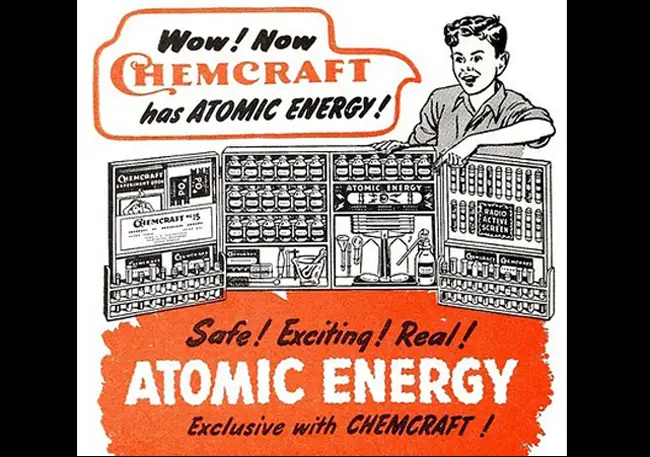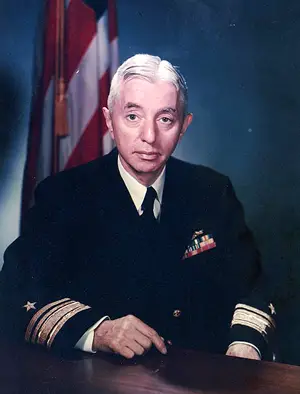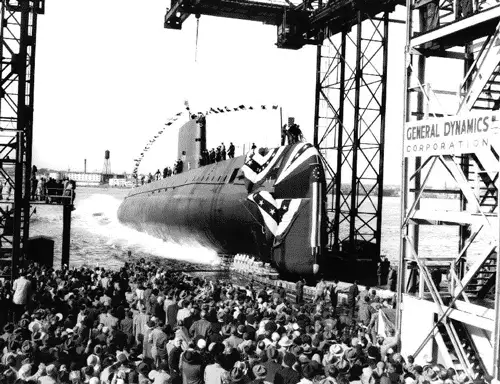
I was fortunate enough to be accepted into the Navy nuclear power program in the early 1970s. It was run at the time by a man the entire world owes an unpayable debt to, Admiral Hyman Rickover—Uncle Hymie. He was charged with taking the knowledge gained from the Manhattan Project and Enrico Fermi’s experiments at the University of Chicago in the 1930s and developing a safe and reliable nuclear reactor to power the first nuclear submarine, the USS Nautilus. He did. He built it from scratch. The Nautilus was reliable, safe and awesome.
Click On:
- FPL and Progress Energy Again Asking To Pass Along Ghost-Nuke Plant Costs
- FPL, Progress Energy, Florida’s Nuclear Fraud
- FPL’s Bogus $1.25 Billion Rate Increase: Ex-PSC Commissioner Nathan Skop Tells All
- Disaster Ready? 5 Nuclear Reactors in Florida, 3 Of Them Within 180 Miles of Palm Coast
In doing so, Rickover learned that a nuclear reactor is the most efficient means ever invented of making steam to power turbines, but also the most dangerous. A nuclear reactor straddles the razor’s edge between a boiler and the Bomb that, in its crudest form, flattens cities. A reactor can be controlled only if the utmost standards are insisted upon with absolute and unwavering resolve. Anything less was a certain path to eventual disaster.
And boy, did Rickover insist. He made sure that anyone who designed, built, controlled or even worked on one of his nukes was without question the Best, capital B. After we blew up two cities with the prototypes, and scared the world (and the Soviets) at Bikini, showing what the new fusion model would do, who was going to question anyone with balls enough to try to actually harness this thing?

(© FlaglerLive)
The Live Commentary
So Hymie had carte blanche to be the biggest bully in the world to safely bring this power to heel. So he did, in spades. He insisted on absolute power over every detail of the submarine fleet, from the captain of the boat to the kid who greased the bearings, taking only the cream of the fleet. From the start of the project in the late 1940s to the time he was forced out in 1981, you had to be in the top 1 percent on any given test to start the program. He made every course so tough that 96 percent of those that entered did not finish. You do the math. A back-breaking year and a half series of schools that exceeded a four-year engineering course at MIT just to work in the engine room, and you wash out 96 percent?
Rickover was just as hard on the companies that built his boats. In the 1980s, that was his downfall. General Electric had enough. But I’m getting ahead of the story.
After his success and renown from the Nautilus project, the country was sold on the promise of peaceful uses of nuclear reactors to generate electricity. Think about it: no fuel costs. We were told that electricity would be so cheap, we wouldn’t even bother to meter it, it would come to your house for free.
Well, maybe. But Rickover had learned what this would require ensuring the safety of the American people. He basically invented the whole process. He knew these promises would never be kept unless the process was controlled by the government without the temptation to cut corners on the construction, operation, maintenance or lifespan of every plant. In short, he understood that you do not surround every city in America with slow-motion atomic bombs to provide electrical power in exchange for a profit to investors. That would invariably lead to cutting corners and disaster.
Rickover did what would be unthinkable today. He used his prestige to insist that any reactor used to generate electricity in the United States should be built and operated by the U.S. Navy to ensure its safety. After all, you did say the electricity would be free, so why would Wall Street want to build nuclear plants anyway?
So the first reactor in the country, Beaver Valley1 at Shippingport, just south of Pittsburgh, went operational in December 1957 and operated under contract to the Atomic Energy Commission from day one until the original reactor was dismantled in 1986 and Beaver Valley 2 was commissioned through 2047. Of course, it was designed and built as well as operated with Rickover for Westinghouse Electric Corporation (Owned by the Mellon family out of Pittsburgh). Most of the $110 million cost (close to $1 billion in today’s dollars) was subsidized by the government’s Atomic Energy Commission. And every kilowatt of the 60,000kw-capacity plant was sold by Duquesne Light (Owned by the Mellon family out of Pittsburgh).
Instead of being too cheap to bother charging for, it seems that Duquesne Lights rates were close to triple the other electric company in Pittsburgh, West Penn Power. Who could have guessed that 30 years later, building nuclear power plants on top of the world’s largest coal field might not be the most cost-efficient way to go? Rickover, of course.

And they sort of could for a while. But every year, the pressure from stockholders on the Jack Welches of the world put dividends first, leaving it to the actuarial bean counters to worry about the exposure-danger vs. maintenance-costs formula. Those operating licenses good for 40 years and extended for 20 got yet another 20-year extension thanks to the retired senator lobbying the energy subcommittee overseeing the now toothless Nuclear Regulatory Commission.
Meanwhile, even the Japanese, engineering geniuses and the world’s most experienced radiation victims, build nuke plants on the coast in tsunami zones, and put back-up generators on ground level and fuel tanks underground, right on the beach, because it would have cost more to put them on the roof, what could possibly go wrong with that?
Uncle Hymie must be spinning in his grave.
Florida Power & Light and Progress Energy know that their own nuclear plans previously on the table are not do-able after the Japan debacle. Even the Germans plan on permanently shutting their entire fleet of 17 nuclear plants by 2022. It’s almost unthinkable that the United States would build new ones any time soon. Lag time between approval and start up would be measured in decades. Witness the ever-lengthening delays surrounding Progress Energy’s and FPL’s plans.
So these two will ask the Florida legislature to let them continue charging us all today, as they have for the past three years, for the nukes they plan to build in the future. And of course the lawmakers who enacted the scheme and the Florida Public Service Commission acting as lackey will let them. Energy independence, rah rah, Hugo Chavez, Arabs, Blablabla. In return for a few campaign contributions, a few rounds of golf, a consulting contract and a paid speech or two, we all know we are going to get screwed.
After a few years, we’ll probably forget all about the money. They’ll keep it. Our elected whores will let them use it for the crisis du jour. If we’re very, very lucky, we will get a small credit dribbled out on our monthly bill for the money they’d have been grabbing for years for the plants that will never get built, minus engineering and planning costs, minus lost profits, minus interest, minus lobbying costs.
Nuclear kabuki and the old corruption two-step. Same as it ever was here in the land we stole from the mosquitoes. But then they didn’t need nuclear-powered air conditioning to live in this swamp, as our nuclear-tipped overseers tell us we do.






























Clinton says
Nuclear power is a fact of life for the US, and until a reliable and abundant source of “alternative energy” is found you can expect that it will continue to be that way. today, the rediculous hoops that anyone planning on building a nuclear plant is required to go through are both costly and time consuming. thus your surcharge for the design and building of new plants. $10 a month is not so rediculous, and if i’m not mistaken that’s less than they’re asking.
additionally the situation in the US is completely different than that of japan, but the catastrophies that occur halfway around the world still teach us lessons every day. Unlike the nuclear ships in the US Navy, civilian plants have had to undergo rigorous inspection and submit plans and timelines to correct any deficiencies in their protection plans.
Should floridians be charged an extra fee for nuclear plants that may or may not be built? well i think that yes you should help foot the bill for the massive expense that starting a project like this incurs… but at one point or another the line has to be pulled to say that it’s either going to happen or it’s not. Where that line is is up to lawmakers to decide. you don’t like their decisions? vote them out of office.
John Englert says
@ Mr. Smith,
I’m a bit surprised that someone who was in the Navy Nuclear program would write something such as this:
“A nuclear reactor straddles the razor’s edge between a boiler and the Bomb that, in its crudest form, flattens cities.”
A nuclear reactor is not a nuclear bomb. There is a great deal more than a “razor’s edge” separating the two.
Reagan says
The “light bulb” aka “incandescent lamp” has been around since 1802. History remembers Edison because he managed to buy out Swan and patent in the US in 1880. There was no inventing. His patent claimed it was an “”Improvement In Electric Lights”. Likewise, “alternative energy” does not need to be “discovered” as another reader suggests. Any of the existing alternatives merely need to be marketed and backed commercially to become predominant.
Such development is where Floridians should be spending their $10 per month. This notion of using assessments to fund major projects makes it easy for the commercial vendor to be in business while transferring all the risks of failure onto the public as investors. For a small community project such as land development, homes and schools, the community is more able to judge the benefits than to understand all the financial and engineering risk aspects of a huge project such as a nuclear development.
The trouble is that commercial interests only need to influence a few legislators to get such funding in motion. However, to back out of such decisions requires bringing hundreds of thousands to the polls after being well educated on the issues.
While nuclear technology has efficiencies, it has risks and those risks have been ignored. Human beings do not measure and mitigate risk easily and likely never will. The author’s article hardly scratched the surface of the decision making processes that have gone on. Nuclear needs a way of thinking that is better risk oriented. Rickover thought he could control the risks, but control is often an illusion. I’ll bet Joseph Swan thought at one time, that his name would be a household word as he branched out from England.
Bill V. says
Amen! Rickover is surely turning over in his grave at the current nuclear power scene. I remember him coming into the office sometime in the late 1970s and grousing that they were going to build nuclear plants on an earthquake fault line (I think he was thinking about California, but it could have been Japan) and that it was “crazy” – one of his favorite words.
Read his final congressional testimony in 1981 and you’ll see just how pessimistic about nuclear power he had become.
NortonSmitty says
Mr. Englert, the only thing separating a Nuclear Reactor from a Nuclear Bomb is an adequate supply of cooling water flowing 24/7 365 days a year as long as it exists. That doesn’t sound like a great deal more to me.
James Bland says
I only spent 6 years as an officer in H.G’s nuclear Navy on USS Birmingham SSN695. Adm. Rickover was definitely hands on, right down to the lemon drops you had to stock for him on his occasional visits. I sadly read where things are not currently run well, but it is typically uncovered during inspections, without incident. When I resigned my commission, I ran as far from Civilian Nuclear Power as I could due to the profit motive and my understanding of how even small things could gather together to put you in peril. That in addition to Three Mile Island and Chernoble [sp] confirmed my decision. Hats off to all the ex Navy Nukes who safely run our current fleet of nuclear power plants.
The costs are too high and the perils are too numerous to think that nuclear power will ever be the entire solution to our energy issues.
Cliff coppen says
Adm Rickover was no doubt- overbearing , he often referred to designers, contractors and builders as-Vendors- perhaps simular in stature to a street vendor with the monkey who were to be watched and controlled at all times..
No doubt he was very knowledable of nuclear power, its potentials and hazards so he took it on himself to make sure the naval nuclear system was the best safest and well managed which it continues to be the best in the world. There are no shortcuts, lax practices or never lax controls. Far different than whats viewed in the civilian sectors world wide..
I give Adm Rickover enormous credit in the establishment of standards and strict controls over nuclear activities which is severly lacking today in most all civilian sectors.Just read the hundreds of internet posted investigations to bear that out. Civilian nuclear power is on the brink of mass problems is something is not done very soon..
Maybe we don,t need another Rickover but we certenly need his brand of controls and standards.
Yes I would say he is spinning- somewhere- as he looks on the current state of nuclear power generation- worldwide.
NortonSmitty says
I appreciate the comments from you guys that have been through the wringer that was Rickovers Nuke program. As difficult as is is to believe in the world today, we never doubted that our efforts were not just blowing smoke for someones agenda. Although we had our noses put to the grindstone every day we never doubted our mission demanded this level of dedication. We were not being tortured, we were being tested.
Because ours was so great a responsibility that it could not be measured by what we earned, (although that was not insignificant) but by the absolute knowledge that the job obligated and demanded it. You sought a higher calling than mere lucre. Admiral Rickover showed us by his own example that advancing your career was nothing compared to protecting the people of the world, including the ones that would undermine this goal to pursue their own agenda.
The degree that he was dedicated to this mission is so far out of the scope of what we witness today it is hard to even fathom that it was tolerated at his level from the powers that were. Though he took this dedication to an extreme unseen even in his day, he was tolerated, no, even respected by these powers because they knew he was right. So he was allowed to lead because to do less would be unethical.
If you want an example of how far out of the norm this is these days you have to look no further than the fate of General Eric Shinseki who was the Army Chief of Staff during the run up to the Iraq invasion in 2002. He stated to the Senate Armed Services Committee that we would need “on the order of several hundred thousand troops” to secure Iraq after defeating Saddam’s army to prevent looting, unlawfulness and insurrection in order to prevent the need for a long-term occupation. This was not what we were promised by Rumsfeld and Wolfowitz, even though any sophomore at West Point would have agreed and as history has proven obvious, he was forced to resign in disgrace after an otherwise exemplary career. Message sent. Obedience first, facts way down the list of importance.
So Uncle Hymie was a standard we shall never see again. We all heard stories of Rickovers rigidity in this dedication. Here’s my favorite. Don’t know if it’s true, but if it isn’t, it’s a great parable.
Rickover was having dinner with the Admiral who had just been appointed to be in charge of Sub Fleet Atlantic. This is the Admiral in charge of one of two fleets of submarines, Atlantic and Pacific. These fleets include both Attack Subs, that sink other subs and surface ships, and the Boomers, ICBM launchers that were one leg of our Mutually Assured Destruction strategy, or MAD as it was so aptly called. This Admiral was just approved by the Senate, President, CIA, Joint Chiefs and the Secretary of the Navy to to culminate his long distinguished career by landing on of the most plum and prestigious billets in the Navy, hell the world. The evening before his swearing in ceremony, he is honored with a dinner with the Joint Chiefs, Political bigwigs and his boss, the man in charge of every facet of every American submarine, Admiral Rickover.
As dinner is served, the Admiral ComSubAtlantic is laughing, schmoozing and enjoying his big night. The dinner is served. The Admiral is talking, and as he starts to take his first bite, Admiral Rickover softly says, “Excuse me, but could I ask you something?” It gets quiet. Hymie continues, “I couldn’t help but notice, when you were served your main course, you were in the middle of your story, and you picked up the salt shaker and salted your food as you were talking”. Silence. “I have to ask, since you didn’t taste your food first, how did you know it needed salt?” After an answer that was on the order of I dont’ know, I just salted it, Rickover just stood and shook his head, and said “‘I’m sorry, I can’t turn over a fleet of Subs that have enough nuclear missiles on them to destroy the world several times over to a man that is so impulsive”.
And they got someone else. While that level of unwavering standards may be extreme and unheard of today, he believed that there are few things in this world that don’t allow for compromise. And I hope we all have to agree that this should be one of them. The safe operation of Nuclear Power plants has to be another.
Not raising taxes on Billionaires and corporations, well, by any standards has to be pages down the list.
Colin Megson says
Not a mention of Alvin Weinberg, the inventor and patent holder on Light Water Reactors (LWRs), of which Fukushima Di-iachi is the Boiling Water Reactor (BWR) type and nuclear submarine propulsion units are the Pressurised Water Reactor (PWR) type. Weinberg worked with Rickover at Oak Ridge National Laboratory (ORNL) to develop the propulsion reactors, but when it came to their use in civil electricity generation, Weinberg vociferously warned of the dangers of loss-of-coolant and meltdown accidents. Weinberg wanted Molten Salt Reactors (MSRs), of which the Liquid Fluoride Thorium Reactor (LFTR) is the modern day version, to be used exclusively for electricity generation, because they are hundreds of times safer than LWRs. LFTRs operate at atmospheric pressure, using hot, chemically stable, fluoride salts as reactor fluid and coolant; there is no pressure or chemically-reactive ‘driver’ to force radiotoxic substances out into the environment. You could site the primary circuit, of a 100 MWe LFTR, underground in the middle of a football pitch and be hard pressed to design an accident that would endanger a capacity crowd, since gravity is the only force working on the reactor fluid. Only a direct hit be an asteroid or a bunker-buster would move stuff upwards and out.
Yet, the Government is virtually unaware of this technology and not investing a dime in getting the first-of-a-kind LFTR built – it would take a piddling $500 million to do this. Secretary Chu, show the electorate that politicians are capable of making the right decisions to allay all fears of nuclear power and set the USA and the world on a safe and pragmatic path to meeting future energy needs.
Cliff coppen says
To Colin. Agree with your post almost in total.. But the government and NRC are/ have been fully aware of Thorium. In fact the US had a experimental thorium reactor in operation and abandoned the development in favor of the current reactor designs.
Why? I believe any other reactor design was simply not American, that a protected monoloply exists to protect and further those companies involved in the futherence of the current-American. designs and the fuel rod manifacture that supports, that is the reason that other conturies(not the US) are activly developing thorium and also the reason why there is so many tonnes of spent fuel rods piling up at every 105 nuclear sites in the US. What,s the real reason that rods are not reprocessed?
Robert says
Palm Coaster and Liana G the petition process is a method that may be used to place a proposed amendment on the ballot. It is the only means the uses voter initiative. All others are controlled by the political parties not the voters. It is not an easy task. I have done preliminary research; first a PAC must be formed. Next is getting petitions signed by a number of voters equal to eight percent of votes cast in the last presidential election. The petitions must also come from at least one-half of the congressional districts of the state.
Needless to say a grass roots organization will be facing those with vested interests to maintain the status quo. And their pockets have no bottoms. But I would be willing to work to eliminate the development of nuclear power in Florida. At least allow the voters to be the ones who determine nuclear power’s future and not the bought and paid for peoples representatives.
ignorancecosts says
To follow this line of thinking, taxpayers shouldn’t fund any of the green energy start-ups. Most of those will never see a return of any significance.
Anonymous says
I disagree with NortonSmitty. A nuclear power plant cannot attain a detonation like a bomb.
There is a difference in the grade of nuclear material and there has to be a flux of neutrons to initiate a multiplying chain reaction. Yes, radiation can be spread but it cannot go full nuclear detonation.